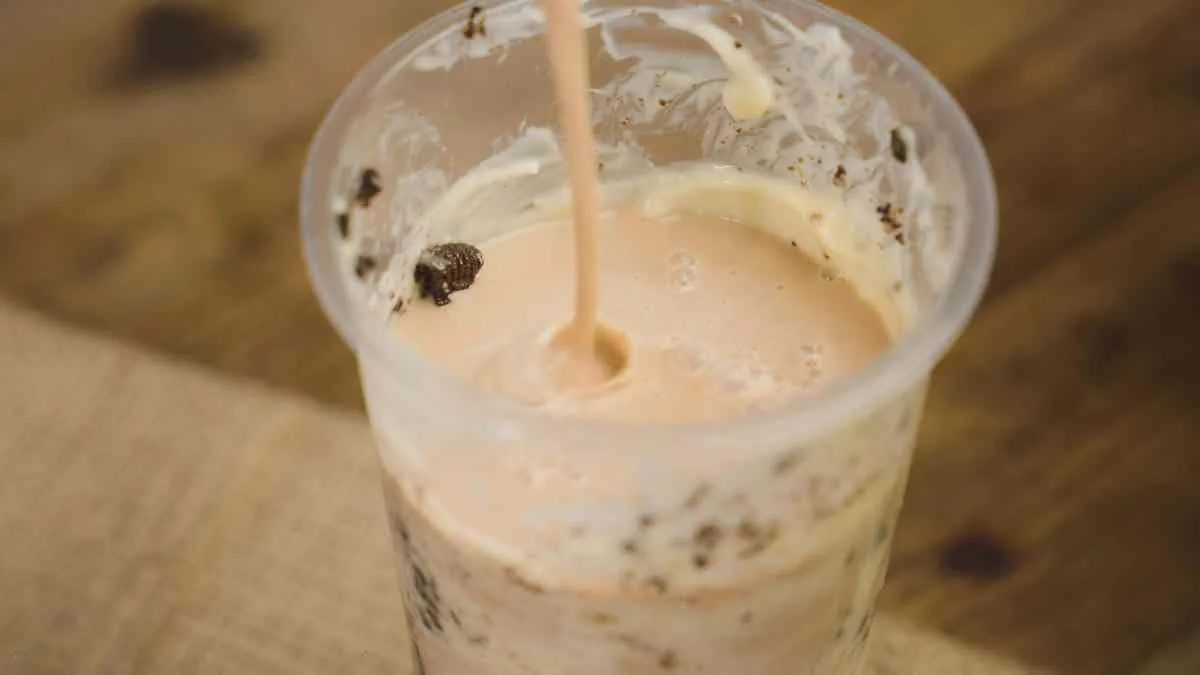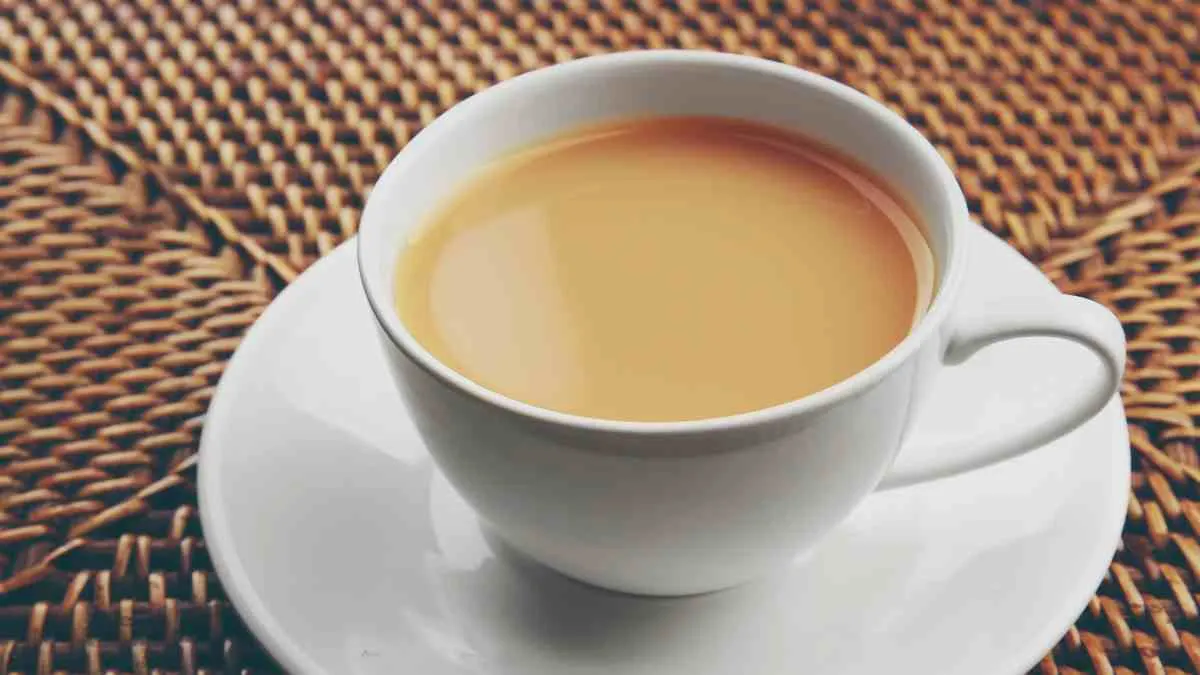Milk tea, a beloved beverage enjoyed by many, is often consumed at various times throughout the day. ButIs It Good To Drink Milk Tea In The Morning At Night.
The answer to this question largely depends on your personal preferences, lifestyle, and how your body reacts to the ingredients.
Hello readers, enjoy the benefits and potential drawbacks of drinking milk tea both in the morning and at night. We’ll also cover common questions people often ask regarding this popular drink.
What Is Milk Tea?

Before diving into the specifics of drinking milk tea at different times of the day, it’s essential to understand what milk tea is.
Milk tea is typically a combination of brewed tea (black, green, or herbal) and milk, often sweetened with sugar. It can also include additional ingredients such as spices (e.g., cardamom, cinnamon) for flavor, especially in varieties like masala chai.
Milk tea is a comforting beverage with a unique blend of caffeine from tea and the creamy texture of milk, making it a popular choice for many.
Is It Good To Drink Milk Tea In The Morning At Night:
A) Benefits of Drinking Milk Tea in the Morning
-
Energizing Start to Your Day
Drinking milk tea in the morning provides a gentle caffeine boost. The tea in milk tea contains caffeine, which can help wake you up and improve alertness, much like coffee. The addition of milk also helps to mellow the bitterness of the tea, providing a smooth, creamy texture. -
Supports Digestion
The tea in milk tea (especially black or green tea) contains antioxidants known as polyphenols, which can aid in digestion and promote a healthy gut. These antioxidants also help to neutralize free radicals in the body, contributing to overall health. Adding milk can further enhance the digestive benefits by soothing the stomach lining. -
Rich in Nutrients
Milk tea is a good source of calcium and vitamin D, especially if you use fortified milk. These nutrients are essential for bone health, making milk tea a nourishing start to the day.
B) Potential Drawbacks of Drinking Milk Tea in the Morning
-
Caffeine Sensitivity
Some individuals are sensitive to caffeine. While milk tea offers a moderate amount of caffeine, it can still lead to jitteriness or anxiety in those who are sensitive, especially if consumed in large quantities. If you experience these effects, you may want to opt for a decaffeinated tea or limit the amount of milk tea you consume in the morning. -
Empty Stomach Issues
Drinking milk tea on an empty stomach may cause some digestive discomfort in certain individuals, especially if the tea is highly acidic. This can result in feelings of nausea or discomfort. If you find this to be an issue, consider having a small meal before drinking milk tea.
According to Healthline, it is generally advisable to avoid drinking caffeinated beverages on an empty stomach, as they may increase stomach acid and lead to discomfort.
Read Next: Does Black Tea Have More Caffeine
Drinking Milk Tea at Night: The Pros and Cons:
A) Benefits of Drinking Milk Tea at Night
-
Relaxation and Comfort
A warm cup of milk tea can have a calming effect in the evening. The milk in the tea can help promote the production of the sleep hormone melatonin, potentially aiding in relaxation. Additionally, the caffeine content in milk tea is usually lower than that in coffee, which might allow you to enjoy the beverage without significantly affecting your sleep quality. -
Helps in Winding Down
A warm beverage like milk tea can be part of a nighttime routine that signals to your body that it’s time to wind down. The act of sipping on something warm and comforting can help ease the transition from the hustle and bustle of the day to a more relaxed evening. -
Rich in Nutrients
Similar to morning consumption, drinking milk tea at night can be beneficial for getting essential nutrients like calcium and vitamin D. These nutrients are vital for bone health and can be especially useful for people who are not getting enough of these nutrients during the day.
B) Potential Drawbacks of Drinking Milk Tea at Night
-
Sleep Disruption Due to Caffeine
Even though milk tea contains less caffeine than coffee, it still has enough caffeine to affect your sleep, particularly if consumed close to bedtime. Caffeine is a stimulant, and drinking it too late in the evening can interfere with your ability to fall asleep, leading to insomnia or disturbed sleep patterns.According to Mayo Clinic, it’s recommended to avoid caffeine for at least 4 to 6 hours before bedtime to prevent it from disrupting sleep (Mayo Clinic). If you’re sensitive to caffeine, it may be best to avoid milk tea in the evening.
-
Indigestion
For some people, consuming dairy products like milk can cause indigestion or discomfort, especially when consumed late at night. This can lead to issues such as acid reflux or bloating, which can interfere with sleep quality.If you find that milk tea at night causes digestive issues, you may want to consider plant-based milk options like almond milk or oat milk, which can be gentler on the stomach.
-
Increased Caloric Intake
Depending on the amount of sugar and milk added, drinking milk tea at night can increase your caloric intake, which may not be ideal if you’re looking to manage your weight. If you’re concerned about this, consider reducing the sugar or using low-fat milk options.
Common Questions:
1. Can Drinking Milk Tea in the Morning Help Me Stay Awake?
Yes, milk tea can help you stay awake, thanks to the caffeine content in the tea. However, the caffeine in milk tea is generally less potent than that in coffee, so it provides a gentler boost without the jitters that may come with coffee.
If you’re looking for a more substantial caffeine hit in the morning, you might want to opt for coffee instead.
2. Is Drinking Milk Tea at Night Bad for My Sleep?
Drinking milk tea at night can be a relaxing experience, but it may interfere with sleep if you are sensitive to caffeine. Since milk tea contains caffeine, consuming it close to bedtime could potentially disrupt your sleep.
If you find that it keeps you awake, consider switching to decaffeinated tea or herbal tea, which can provide relaxation without the caffeine content.
3. Can Milk Tea Help with Digestion?
Yes, milk tea can support digestion, especially if the tea contains black or green tea, which are rich in antioxidants and polyphenols.
These compounds are known to help improve digestion and gut health. The milk in the tea also has a soothing effect on the stomach, which can help with digestive comfort.
However, if you are lactose intolerant, you may experience digestive discomfort from dairy milk and should consider plant-based milk alternatives.
4. Is It Okay to Drink Milk Tea Every Day?
Drinking milk tea every day is generally safe for most people. However, it’s important to keep an eye on your caffeine intake and sugar levels, especially if you consume milk tea in large quantities.
If you’re concerned about these factors, consider using less sugar or opting for plant-based milk.
5. Can Milk Tea Be Part of My Weight Loss Plan?
While milk tea can be a delicious and comforting beverage, it’s important to be mindful of its calorie content. The addition of sugar and milk can significantly increase the calorie count.
If you’re watching your calorie intake, consider reducing the sugar or using lower-calorie milk alternatives, such as unsweetened almond milk.
Last Call:
So, is it good to drink milk tea in the morning and at night? The answer depends on your personal preferences and health needs.
Drinking milk tea in the morning can be an energizing start to your day, providing a gentle caffeine boost. In the evening, it can help you relax, but you should be mindful of its caffeine content if you’re sensitive to stimulants.
If you’re looking to enjoy the benefits of milk tea without the potential downsides, consider decaffeinated tea, reducing sugar, or opting for non-dairy milk alternatives.
Ultimately, the decision to drink milk tea in the morning or at night should be based on how your body reacts and what works best for your lifestyle.
For more information on healthy tea habits and alternative tea recipes, be sure to explore our related articles on benefits of tea and caffeine content in drinks.

